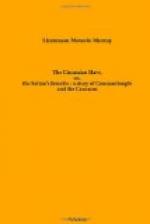As exhibited in our illustration, the Sultan would often seek her side in the harem, his tall, manly form contrasting strongly with her gentle and delicate proportions, and he would regard her thus with tender solicitude, too fully realizing her misfortune not to pity and respect her, and he felt too that these frequent meetings were binding his heart in a tender bondage to her. Sultan Mahomet was a fine specimen of a Turk; in features he was markedly handsome, and his long, flowing beard gave to him the appearance of more age than was rightfully his. His physical developments were manly, and to look upon he was “every inch a king.” Lalla was no less beautiful as a female; indeed she was far handsomer as it related to such a comparison, and those who saw them so often together in the harem could not but think what a noble pair they were, and seemingly worthy of each other.
She possessed all that soft delicacy of appearance that reminds the sterner sex how frail and dependent is woman, while she bore in her face that sweet and winning expression of intellect, that, in other climes more favored by civilization, and where cultivation adds so much to the charms of her sex, would alone have marked her as beautiful. Her eyes, which were surpassing in their dreamy loveliness, were enhanced in beauty by a languid plaintiveness that a realizing sense of her misfortunes had imparted to the expression of her face, while her whole manner bore that subdued and quiet air that sorrow ever imparts. Those of her companions who knew her best, could easily understand that her heart was far away from her present home; for her actions spoke this as plainly as might have ever been done by words, and poor Lalla, wherever she had come from, and under whatever circumstances, had evidently left her heart behind her among her childhood’s scenes.
The Sultan was earnestly interested in his dumb but beautiful slave, and instituted a series of inquiries as to her history. His agents were instructed to find out, if possible, the mode in which she had been brought hither, and also to learn, if possible, the manner and cause of her leaving her native hills in the Caucasus; for of these things the fair girl had no means of communicating. The monarch and all Constantinople knew that her people generally looked forward with joy to the time when they should be old enough to be taken to the Turkish capital, and seek their fortunes there, and the fact of this being so different apparently with Lalla, created the more curiosity to ferret out her story.
But all their efforts were useless in the pursuit of this purpose. Since the Sultan’s object in the inquiry was announced, much time had transpired; but had his proclamation met the eye or ear of those who transported the fair Circassian hither, they would hardly have responded to it, as it might, for aught they knew, cost them their heads. And thus the gentle slave lived on, a mystery to those about her which even she was unable to solve.




